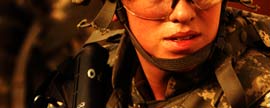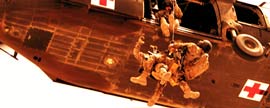Foreword: One of the most striking features of Operation DESERT STORM’s aftermath was the facility with which American soldiers transitioned from offensive warfare to humanitarian relief. Throughout history our soldiers- and the civilians who accompany them-have been quick to assist populations in need, whether the victims of natural disaster, military operations, or calculated oppression . The increasing number of noncombat military operations in recent years underscores the significance of this rehabilitative role of the American soldier.
Not since World War II had U.S. Army soldiers and civilians played as large a role in rebuilding a foreign nation as they did in Kuwait after the Gulf War. After DESERT STORM tells the compelling story of how the Army helped to bring a proud but battered country back to life. Our soldiers found themselves performing such diverse roles as repairing police cars, rebuilding damaged power systems, restoring the water supply, and feeding zoo animals. In the process they touched the lives of every Kuwaiti resident, forging bonds of trust and contributing immeasurably to stability in the region.
Though immensely successful, the Kuwaiti recovery operation was not perfect; After DESERT STORM highlights key lessons learned. The reconstruction of Kuwait clearly demonstrated that post-hostilities activities can be as important as conflict itself, and that military leaders must plan carefully for such a recovery mission if they are to capitalize fully on battlefield success. After DESERT STORM illuminates appropriate roles for American soldiers and civilians in a post-hostilities environment. We would be wise to take its lessons to heart.













